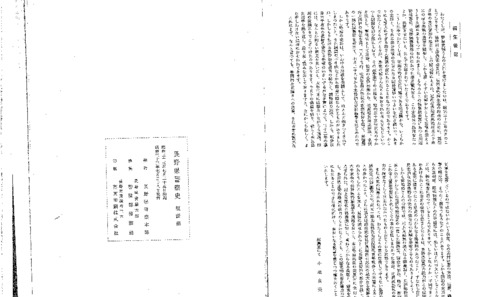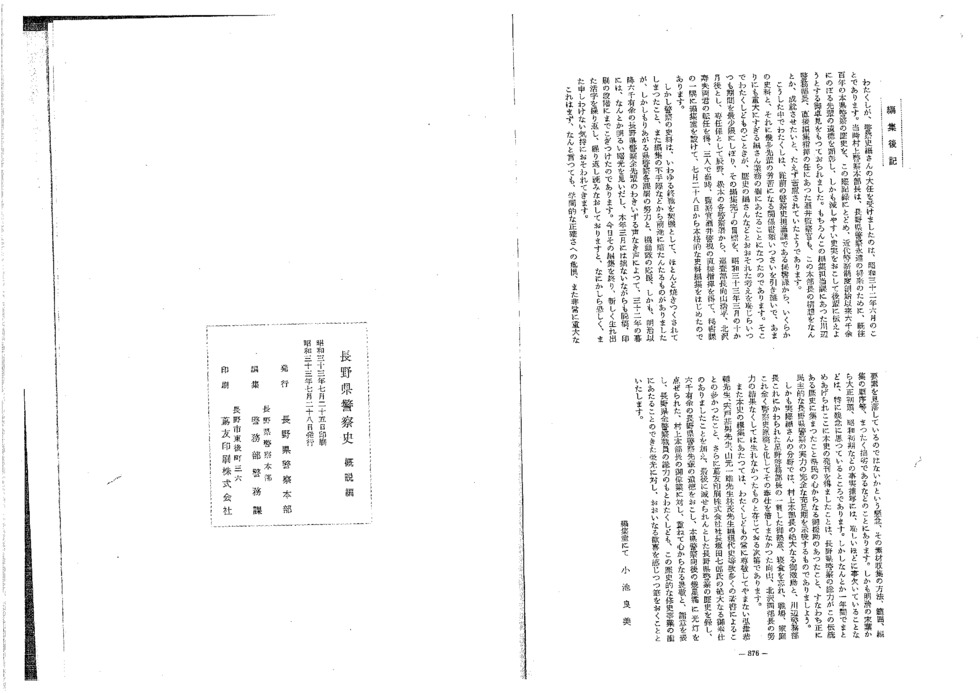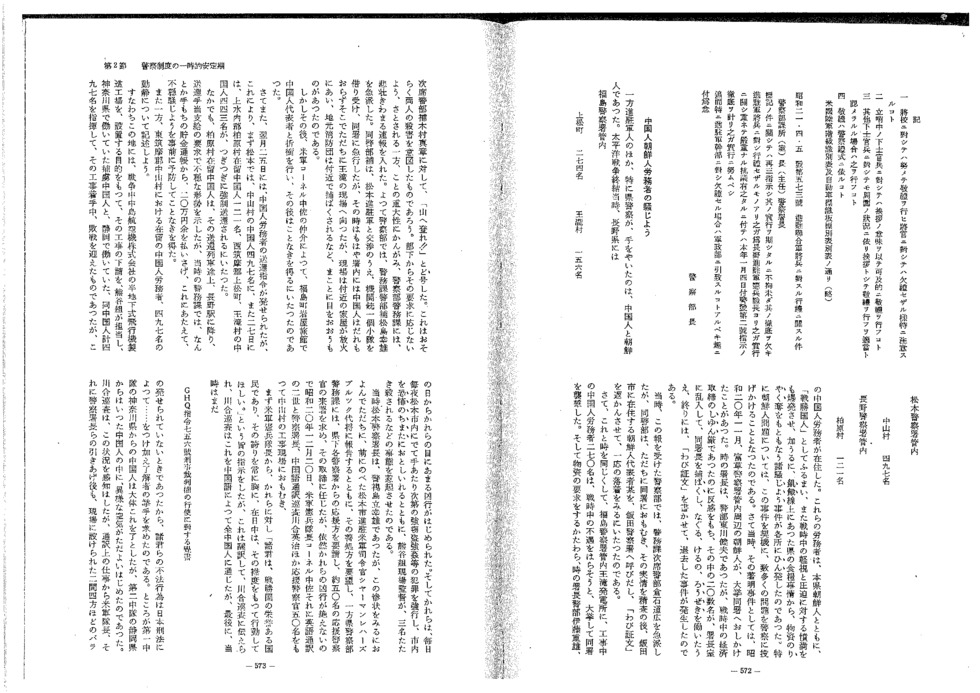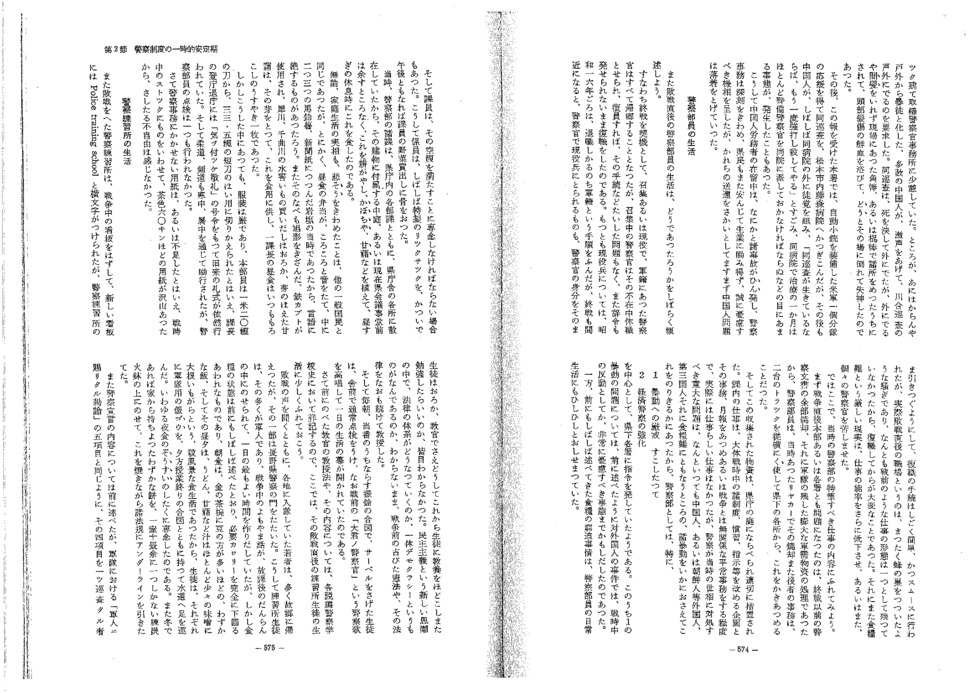Page 1
Page 2
Page 3
December 22, 2017
Nagano Prefectural Police History Overview
Classification code: III-003
Publication year: 1958
Nagano Prefectural Police Headquarters
Nagano Prefectural Police History Overview
Nagano Prefectural Police Headquarters, Police Affairs Department, Police Affairs Section, Nagano Prefectural Police History Overview (Nagano Prefecture Police Headquarters 1958).
- 572-574
Civil Disturbances by Chinese and Korean Laborers
On the other hand, in addition to the Occupation Forces troops, the prefectural police had difficulties in particular with Chinese and Koreans. At the time of conclusion of the Pacific War, there were the following Chinese laborers residing in Nagano Prefecture.
Within the jurisdiction of the Fukushima Police Station
Agematsu Town: 274 persons
Otaki Village: 156 persons
Within the jurisdiction of the Matsumoto Police Station
Nakayama Village: 497 persons
Within the jurisdiction of the Nagano Police Station
Kashiwabara Village: 121 persons
These laborers, together with Koreans in Nagano Prefecture, behaved as members of the victorious countries and gave vent to their resentment against the contempt and oppression that they had suffered during the war. Also because of the food situation of the prefecture, which was on the verge of starvation, there were frequent outbreaks of civil disturbances at various locations which involved the looting of goods. In particular, with regard to issues with Koreans, starting from these incidents, many problems were brought to the attention of the police. One outstanding case at that time occurred in November 1945 when a large number of Koreans living near the jurisdiction of the Tomikusa Police Station burst into the police station. The chief at that time was Inspector Takeo Higashigawa. Feeling angry about the strict economic controls that they had endured during the war, more than 20 of them broke into the chief’s office, caught the chief, punched, kicked and assaulted him, and made him write a “written apology,” and then left.
When the Prefectural Headquarters Police Department received this report, they immediately dispatched the assistant chief of the Police Affairs Section, Inspector Michihiro Kuraishi, who promptly went to the Tomikusa Police Station, carefully investigated the facts, called a certain representative of the Korean people who lived in Iida City to the Iida Police Station, and had him return the “written apology,” and the situation temporarily calmed down.
Around the same time as this, at the Otaki Power Plant in the jurisdiction of the Fukushima Police Station, 270 Chinese laborers who were working in construction attacked the police station en masse seeking retribution for their suffering during the war. Along with demanding goods, they yelled at Inspector Shigeo Ito, who was the chief, and Assistant Inspector Masaaki Kimura, who was the assistant chief, to “climb up the mountain.” This was probably a plan to murder both of them. While being warned by their subordinates not to give in to those demands, reflecting on the gravity of the situation, they sent a grim, urgent report to the Police Affairs Section of the Prefectural Headquarters Police Department. The Prefectural Headquarters Police Department immediately dispatched Assistant Inspector Yukio Matsushima of the Police Affairs Section. He negotiated with the Occupation Forces stationed in Matsumoto, borrowed the service of one machine gun platoon, and rushed to the Fukushima Police Station. However, there were no longer any Chinese in the police station when they arrived, so they immediately proceeded to the Otaki Power Plant. At the plant, it was a horrible sight. Houses in the neighborhood had been set on fire, and the local fire fighters had been captured nearby.
Thereafter, however, with intermediation by Lieutenant Colonel Cornell (phonetically rendered) of the U.S. military, negotiations were held with representatives of the Chinese people at the Iwaya Inn in Fukushima Town, and there have been no problems since.
Also, an order was issued for the repatriation of Chinese laborers on the 25th of the following month, and accordingly, to begin with, in Matsumoto, 497 Chinese residing in Nakayama Village were forcibly repatriated, followed on the 27th by 121 Chinese residing in Kashiwabara Village, Kamiminochi District, and 443 Chinese residing in Agematsu Town and Otaki Village, Nishichikuma District, one after another.
Among these, the Chinese residing in Kashiwabara Village got off from the train carrying them home in Nagano, and the situation became menacing as they demanded payment of an allowance for them to return home. The Police Affairs Section managed to withdraw over 200,000 yen from a savings passbook on hand and gave them those funds, and was able to prevent a civil disturbance beforehand, without further problems.
Next, I will describe the activities of the 497 Chinese laborers residing in Nakayama Village, Higashichikuma District.
In this area, during the war, Kumagai Gumi was the contractor for constructing a semi-underground aircraft manufacturing plant for Nakajima Aircraft Corporation, and supervised a total of 497 Chinese prisoners who had been working in Kanagawa Prefecture and Shizuoka Prefecture. Japan was defeated in the war just as that construction was being initiated, and the unpardonable atrocities of these Chinese began from that day. They went into Matsumoto City every day and every night, committed burglary, theft, rape, and other crimes, put the town under a siege of fear, and beat three Kumagai Gumi foremen to death.
Seeing these miserable conditions, the Chief of the Matsumoto Police Station at that time, Superintendent Yukio Shimadate, immediately reported the situation to Brigadier General Sherman Hasbrouck, Commander of the Occupation Forces in Matsumoto City, requesting that appropriate measures be taken , and also asked the Police Affairs Section of the Prefectural Headquarters Police Department to send support from each police station in the prefecture, seeking around 50 police officers as reinforcements to report to the Matsumoto Police Station, and he assigned them to take control, but the Chinese continued their atrocities. So, on December 20, 1945, U.S. military Provost Marshal Lieutenant Colonel Cornell , an English-language interpreter who was a second-generation Japanese-American, the Matsumoto Police Station Chief, and patrolman Eiji Kawai (a Chinese-language interpreter), went to the construction site in Nakayama Village together with reinforcements in the form of 50 police officers.
First, the U.S. Provost Marshal said to the Chinese, “You are honorable citizens of a nation that was victorious in the war, so you should always feel pride, and I urge you to act with generosity while you are in Japan.” This was translated into Japanese and conveyed to Patrolman Kawai, who translated it into Chinese for all the Chinese, and finally, as GHQ SCAPIN 756 Exercise of Criminal Jurisdiction had not yet been issued, he added the phrase, “your illegal acts will be … under Japanese criminal law,” and asked those who understood to raise their hands. As it happened, most of the Chinese in Company 1 from Kanagawa Prefecture understood this, but there a strange atmosphere began to spread among some of the Chinese in Company 2 from Shizuoka Prefecture. Patrolman Kawai sensed this, but even after the U.S. Provost Marshal and Matsumoto Police Station Chief left because he was interpreting, he remained briefly at the 12’ x 12’ police office shack assembled at the site. Then, unexpectedly, a large number of Chinese who had turned into a mob came yelling from outside the shack, demanding that Patrolman Kawai come out. Kawai stepped out prepared to die, and as soon as did he so, he was beaten all over his body with clubs and pieces of timber that were at the site. He was covered with blood from his split skull, and he fell and fainted right there.
Thereafter, upon receiving this report, with assistance from a U.S. military squad equipped with automatic weapons, the Nagano Prefectural Police transported Patrolman Kawai to Fujimori hospital in Matsumoto City. But thereafter, Chinese frequently gathered outside of that hospital, threatened to beat him again and kill him if he were still alive, and the situation was so bad that police officers had to be sent to guard the hospital during almost all of Kawai’s month-long stay there.
In this way, while the Chinese laborers were present, all types of incidents frequently occurred, police work became extremely serious, prefectural residents could not conduct their business without concerns, and conditions were truly troubling. However, the problems with Chinese people began to die down as they were repatriated.





